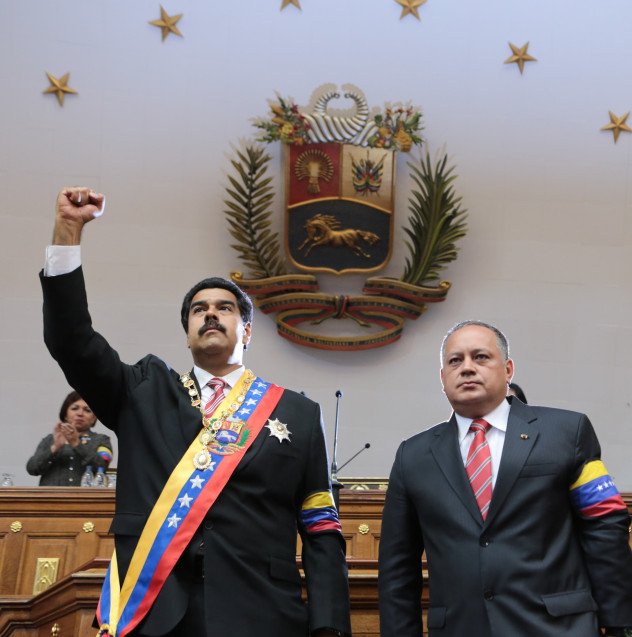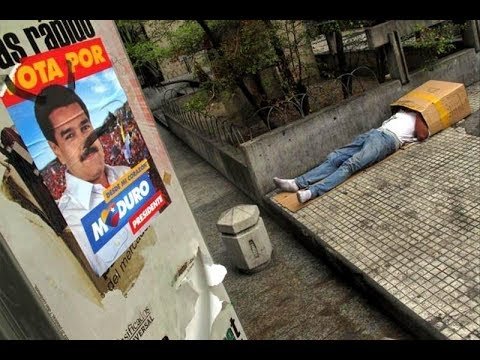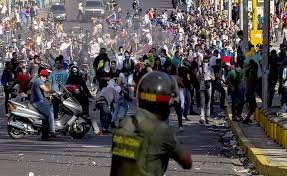This essay has as main goal: to better transmit what the feelings of a young person living in the so called “Socialist Venezuela”. It is relevant to generate a context of the country, so I can then express, from my vision, what is lived –and felt- as a university student in that cruel reality.
Socialism began in Venezuela with the election of Hugo Chavez back in 1998, when I was –barely- 4 years old. He came to the presidency with promises of bringing radical and definite changes –which he achieved- to a Venezuela hit by bad political, economical and social management. During his very first month of government, he changed the, as he said it, “dying constitution” of 1961 for the “modern” constitution of 1999 (yes, the same one Maduro’s government is re-writing at the moment), where the deep social and economical changes start taking root. After a social crisis created by a society that wanted to prevent the mistakes those changes would bring, Chavez’s government grew stronger thanks to the creation of multiple aids programs such as: food a very low prices, thousand of health centers attended by Medical Doctors brought from Cuba; bursary, pensions, houses, cars, fields and others. If analyzed superficially, those programs seem inoffensive and beneficent in the development of a country, however, it slowly triggered a society used to receiving gifts from the president; who was able to manipulate people through them.

This all was possible thanks to huge amount of money Venezuela got thanks to its crude oil exportation, with a price of USD 60$ per barrel and a sustained increase. Its higher spot by 2008 reached USD 130$ per barrel, standing over USD 100$ again by 2010 (Scrofina, 2012). The extremely dependence to the crude oil, together with a severe regulation on the economical field, understood as the intervention of the State to control the actions of the companies and citizens, in order to define what they can do, and how to do it (Gomez, 2008), elicited, not only a pause in the foment of other productive engines, but a complete collapse of the previously existing. Finally by the end of 2013 the president Hugo Chavez died. After an election with a very ‘stormy’ political climate, Chavez’s “political son” won the elections and assumed the reins of the socialist Venezuela. By this time, the crude oil price started to decrease a little, but with a clearly downward trend, eliciting almost imperceptible changes on Venezuela’s economy. Even though, not only did the Maduro’s administration kept the economic policy of Chavez with a very high public spending but increase it, looking to maintain people’s love for the revolution. With a process of accelerated spending and bad economic politics, the decrease of the crude oil prices and no other productive areas flow into the actual crisis of Venezuela, where just to summarize, there is shortage of basics aliments, medicines, there is an estimated cumulative inflation for 2018 of 13,000 % (Those are numbers estimated by the FMI given that the Central Bank of Venezuela haven’t made public this data since December of 2015, when the inflation reached 180.9 %), overwhelming insecurity, etcetera.



Maduro's Presidential Inauguration 2.013

In matter of violence divided by Briceño Leon (2008) in three types: physical, psychological and structural. Psychologically the “emotional aggression to another person and can be active or passive (…) by action or omission, as verbal offense or as silence” (Briceño Leon, 2008 p. 28); the structural means “the social conditions that given their material lacks represents an aggression against the human being and their life quality” (Briceño Leon, 2004 p. 28); and by physical violence “the use of physical force or power, threatened or actual, against other or oneself” (Briceño Leon, 2009 p. 29). It’s clear that Venezuela is going through a violence crisis in all its aspects; however, we can only talk with sustenance about the last 2 ones: the presence of structural violence in our society given its close relationship with poverty, explained it in detail on the previous paragraph. Regarding physical violence, Caracas, our capital has been considered the most violent city in the world in 2016, and the second one in 2017 (D’hoy, 2017; BBC, 2018).

By the time this was written (April 2017) given the unsustainable social situation, the country was going through -maybe the greatest crisis in the contemporary history of Venezuela protests in all the national territory, tens of people murdered by the military force, repression of the right to protest, repudiation of the Legislative Power, rupture of the constitutional order, the denounce by the ex Attorney General (today in exile) Luisa Ortega Diaz and a call for a “national constituent assembly” (today, completely installed) where the constitution is going to be rewritten.

Once contextualized, I asked, what is it like to be a young university student in the Socialist Venezuela? But, it would be better to ask what does it feel to be a young university student in the Socialist Venezuela? Those are really deep questions, very discussed and bitterly debated in these moments. Nevertheless, I’m going to try to answer it from my own subjectivity “What do I feel being a young university student in the Socialist Venezuela?”
Being an university student is (or, should be), as I always has been told, the best moment of your life, the moment where you define, or finish defining your identity; where you build your future, where you train yourself to achieve the goals you’ve always wanted. That moment when you’re free, you feel great, the owner all the knowledge, with a spirit of hopefulness and above of all, wanting to go out and take the world on our hands. We’ve been promised long journeys on that dreamed campus, hours of frustration for some subject, and also fun and happy hours in its gardens.
And in return we’ve promised a university with freedom of thought, builders of knowledge, with the opportunity to grow up and improve our social-economic situation.
But what happened? Where did all those promises go? No one told us about being afraid of walking around that great university campus, no one told us that we shouldn’t take valuable objects to our second home, or that because of thinking differently and wanting to do the things in the right way, you could get hurt. No one warn us that we could be murdered during morning of classes. No one told us that we should strongly debate between missing more classes or going to wait in line to buy some food. No one prepared us to study in that line. No one thought us how to find food at affordable prices, and much less, to administrate ourselves with hyperinflation.
How would we know that we should divide our thoughts between the test and the classmates being murdered on the streets? How could we be prepared to assume the reins of a process of social change? How the hell could we be prepared to sacrifice semesters in order to recover our country? The answers is easy, no one knew it. No one knew that this generation would had to sacrifice the best moments of our lives to save our country from the tyranny, the autocracy and the systematic violation of the human rights. However it was on us, university students, young workers, fathers, mothers, grandparents to go out on the streets and risk our lives looking for the defense of the nation.
But, have you ever asked yourself, what does it feel? What does it feel to see your dreams thrown down? What does it feel to live in the eternal debate between “should I stay and finish my career” or “should I go away to have a better life”? What does it feel to say goodbye to your friends, parents, siblings and partners at an airport without the certainty of ever seeing them again?. What does it feel to live with that overwhelming feeling of “we’re never getting out of this”? The feelings are diverse and complex. Anxiety, anxiety for not knowing what the future is bringing us on this adverse situation. Will I be able to continue studying? Could I finish my career? Will I be stolen today? Will I be the next one on the statistics of violent deaths in Venezuela? Yes, it does sounds fatalist, even dramatic, but I ask you, Venezuelan, have you ever made yourself those questions? Fear. The fear of going out on the streets, fear of getting sick and not finding medicines, fear that perhaps one of your friends could be unfairly imprisoned or murdered in a manifestation. Fear that we will forget what Venezuela used to be, habituating to the dictatorship. Sadness, sadness of seeing how your classmate has drop his/her dreams for the wellness. Sadness of seeing a family separated against their will just to search the quality of life that our country doesn’t offer, and of seeing parents sad for not being able, not only to keep the promises that one day made to their children, but for not being able to fulfill the basic needs of their family. Sadness, but also anger and frustration of seeing people day by day searching food on the trash. Anger, anger of seeing how many people who one day promised to work for their people, has turn out on their murderers, thieves and responsible of the disgrace in which Venezuela is. Anger of how injustice is part of the everyday, anger that violence has turn into the only way to solve problems and nobody does anything about it.
Nevertheless, I feel hopeful, and I am here to talk to all my generation, to all the young people in the country. I have, and I hope we all do, hope. Hope to recover our country from disgrace and lead it into the democratic and pluralistic path so that we don’t get tired or have fear to do everything that’s needed. I hope that we will spend all the energy necessary to educate in citizen and democratic values; but, above all, I have the hope that it will be us, in our individuality that will create change and establish a role model and that we will not get tired of. I would like to close, with a fragment of a letter written by the great Carlos Cruz Diez “... anyways, everything must be reinvented in Venezuela, how wonderful!”

Congratulations! This post has been upvoted from the communal account, @minnowsupport, by jmrock from the Minnow Support Project. It's a witness project run by aggroed, ausbitbank, teamsteem, theprophet0, someguy123, neoxian, followbtcnews, and netuoso. The goal is to help Steemit grow by supporting Minnows. Please find us at the Peace, Abundance, and Liberty Network (PALnet) Discord Channel. It's a completely public and open space to all members of the Steemit community who voluntarily choose to be there.
If you would like to delegate to the Minnow Support Project you can do so by clicking on the following links: 50SP, 100SP, 250SP, 500SP, 1000SP, 5000SP.
Be sure to leave at least 50SP undelegated on your account.
Congratulations @jmrock! You have completed the following achievement on Steemit and have been rewarded with new badge(s) :
Click on the badge to view your Board of Honor.
If you no longer want to receive notifications, reply to this comment with the word
STOPCongratulations @jmrock! You received a personal award!
You can view your badges on your Steem Board and compare to others on the Steem Ranking
Do not miss the last post from @steemitboard:
Vote for @Steemitboard as a witness to get one more award and increased upvotes!
Congratulations @jmrock! You have completed the following achievement on the Hive blockchain and have been rewarded with new badge(s) :
Your next target is to reach 50 replies.
You can view your badges on your board and compare yourself to others in the Ranking
If you no longer want to receive notifications, reply to this comment with the word
STOPSupport the HiveBuzz project. Vote for our proposal!